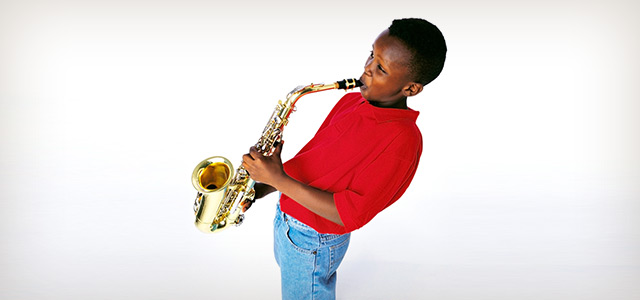We all know learning a musical instrument enhances cognition, trains focus, and helps channel adolescent energy. There’s also the added benefit of a built-in social network of kids working to bring alive once again the musical works of the masters. In spite of all that good stuff, though, some instruments might pose a hazard to the integrity of your child’s teeth, mouth, and jaw – and even their overall health. For most parents, this isn’t top of mind when considering or fostering the learning of a musical instrument. Let’s take a look at what should be on your radar.
- Bacteria: We’re all pretty good at annihilating the bacterial nasties that crop up around our children at home, but how good are you at cleaning their spit-collecting musical machine? Brass and wind instruments harbor a bounty of nasty molds, yeast and bacteria that can cause asthma and a host of other illnesses. Those yucky spit monsters can indeed make your child ill. So be sure their instruments are cleaned regularly, and cleaned well. Doing so can help your child stay healthy, and keeping them clean will also help the instrument perform at its best. Here’s a very comprehensive grouping of instructions to help you clean both wind and brass instruments. Print ‘em out and hang ‘em on the fridge!
- Lip and Tooth Trauma: Because playing a wind or brass instrument requires the player to forcefully hold their instrument against or within the lips to produce a sound, this pressure can present problems for delicate lip tissue and growing teeth. Soft acrylic guards can be purchased to offset some of this pressure, and are commonly used for children wearing braces. Ask your dentist for suggestions.
Additionally, children prone to cold sores can suffer more frequent outbreaks due to playing an instrument. You’ll see this cause’n’effect play out by noticing where your child tends to get sores. Woodwind players tend to have outbreaks on the lower lip, and brass instrument players on the upper lip. Woodwind players also experience outbreaks at a rate twice that of non-musicians.
- Head and Neck Trauma: A stringed instrument might seem like the most benign choice, then, when picking an instrument for your child. After all, there’s no contact with the lips or teeth, and there’s no bacteria to worry about – seems like a safe bet. Until you stop to realize the position one has to get in to play these instruments. Holding a violin or viola all day might not be the best thing in the world for ones face, neck and chin. Good playing posture, and reduced playing time is the best preventative medicine if your kids play these two instruments. It’s also worth noting that because of this awkward playing position, violas and violins can contribute to, and even exacerbate, cross-bites and overbites. So consult with your dentist and music teacher for the best advice specific to your child. Which brings us to your last, but essentially first, concern …
- Choosing the right instrument: Before your child even picks up an instrument, consult with a music teacher familiar with how a player relates to that instrument. A well-informed, passionate band director will know which instruments fit which children best based on their size and weight, teeth structure, finger and hand strength, etc. So ask their opinion and help your child perform well and be well. Here is a wonderfully thorough primer on choosing the right instrument for your child that can help get you started.
The Coda
Life is about balance. And, even at its most positive, certain things we enjoy can have drawbacks. Participation in a youth athletic league, for example, has a tremendous amount of benefit, and an equal amount of ouchie-inspiring moments for both kids and parents alike. So, please don’t toss the baby out with the bathwater on this one … music is a precious skill that brings a lifetime of joy that can not only be felt on a personal level, but shared with others. And that’s a skill worth championing. Just know the risks, manage them accordingly, and help your kids play some beautiful, soul-enriching music!If this topic interests you, much of this topic was built upon research conducted by the School of Dentistry, at The University of Queensland, Australia.

